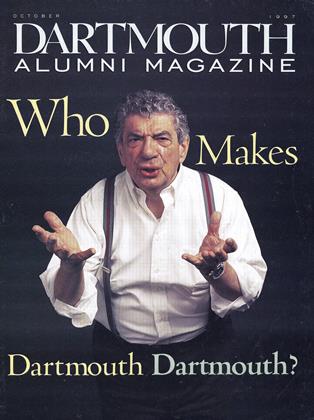Divers Notes and Observations
IN AUGUST the search for a new provost of the College went no farther than the second floor of Went worth, where Acting Provost Jim Wright simply removed the word "Acting" from his title. Wright, who since 1969 has been professor of history, for eight years dean of the faculty, acting president during President Freedman's six-month sabbatical, will now be the College's second ranking administrative officer, with responsibility for just about everything that is not nailed down, and a lot that is. At the top of his list will be the hiring of new deans of the Med School and Thayer, and the development of the new library and its facilities. As dean of the faculty, Wright led the committee that engineered the first major change in the curriculum in 70 years. It would have been hard to find anyone with a greater knowledge of Dartmouth or capacity for leadership in the College's affairs.
Two auspicious events for two of the College offices under Wright's purview, computer services and the Hood Museum: The National Science Foundation just awarded Dartmouth $350,000 to convert from its present Internet connection to vBNS, the NSF's very-high-speed new Backbone Network Service. The link should greatly enhance teaching capabilities, as well as provide help to researchers in a variety of fields. And second, the Hood has just received a large collection of rare Old Master and nineteenth-century prints, engravings, and woodcuts (including 29 etchings by Rembrandt) from the estate of the late Adolph "Bucks" Weil '35, a long-time benefactor of the Hood. The works went on display September 16.
Clearly the highlight of the summer drama season (if you except The Big Apple Circus) was the student performance of Tom Stop pard's Arcadia, ably abetted by British professional Samuel West in the role of Septimus. The play itself is an across-the-curriculum enthusiast's dream, including drama, painting, poetry, landscape architecture, and mathematics—and all these were the subjects of six fascinating lectures held before and during its tenure, at the Moore Theatre. The play is about a multi-generational family. The present descendants, in the same room of the same English country house, are engaged in uncovering mysteries of what occupied the original family in the early 1800s—such as an attempt by the mathematically precocious daughter at what is now called chaos theory; the major revisions of the estate's extensive gardens; and the possible murder, in a duel, of a rival poet by none other than Lord Byron (who never appears on stage).
The major sport of the season was avoiding the teeny-boppers of the T-shirt-and- sneakers set that regularly marched to and from their tennis, soccer, and lacrosse summer camps. However, in the cool of Lake Placid's Olympic Arena, women's hockey stars Gretchen Ulion '94, Sarah Tueting '98, and Amy Coelho '97 have been trying out for the USA team for next year's Winter Olympics.
We're pleased to report that the Ledyard Bridge looks almost ready for its road bed. (If we'd only been there to see the crane lower those new monster girders into position to be bolted in place!) The problem is now the West Wheelock Street hill, mangled into frame-rattling rubble to get sewer and drainage and other underground service replaced before the road gets resurfaced. But because of the default of the original contractor, work is still stopped as we write this, and the street resembles a not-adequately-demolished minefield.
Back in the earliest '70s Jean Kemeny recounted in her book It's Different atDartmouth the history department's redoubtable Marysa Navarro circling the Green before a cheering crowd, in full football regalia—shoulder pads, cleats, helmet, and cape—to pay off a bet that Dartmouth would not go co-ed. On October 17, approximately the anniversary of that memorable run, the College will celebrate 25 years of coeducation. Thereafter, each Thursday for a year, there will be a performance, an exhibit, a round table discussion, or a leading speaker, to commemorate the arrival of women in Hanover. For example, exactly two minutes before we went to press, it was announced that 1997's Convocation speaker would be the distinguished American novelist Louise Erdrich, herself a member of that pioneer coed class of '76.
The year-long bicentennial of the Medical School came to a spirited close just last weekend, with a look-ahead symposium, "Great Issues for Medicine in the 21st Century," featuring Vice President Gore as a keynote speaker, talks by former Surgeon General C. Everett Koop '37 and three Nobel winners.
The annual farewell dinner for visiting faculty was enlivened this year by a reading of the "top ten ways to tell you're at Dartmouth." The list, compiled by the 15 embarking scholars, included, at number six: "You are assigned a classroom with only two $20,000, triple-beam ceiling-mounted projectors." Number four: "You get lost and have to be rescued from the Baker stacks." Coming in at number three: "Both of the students with whom you are chatting are valedictorians." And their number ten (our number one) way to know you're at Dartmouth: "There are as many dogs in class as students."
 View Full Issue
View Full Issue
More From This Issue
-
 Cover Story
Cover StoryPeter Bien
October 1997 By Robert Sullivan '75 -
 Cover Story
Cover StoryM. Lee Pelton
October 1997 By Jane Hodges '92 -
 Cover Story
Cover StoryMarysa Navarro-Aranguren
October 1997 By Holly Sorensen '86 -
 Cover Story
Cover StoryThey Make Dartmouth Dartmouth
October 1997 -
 Cover Story
Cover StoryWilliam Cook
October 1997 By Heather McCutchen '87 -
 Cover Story
Cover StoryChris Miller '97
October 1997 By Jake Tapper ’91
E. Wheelock
-
 Article
ArticleDR. WHEELOCK'S JOURNAL
NOVEMBER 1990 By E. Wheelock -
 Article
ArticleDR. WHEELOCK’S JOURNAL
December 1990 By E. Wheelock -
 Article
ArticleDR. WHEELOCK'S JOURNAL
NOVEMBER 1991 By E. Wheelock -
 Article
ArticleDivers Notes & Observations
MARCH 1992 By E. Wheelock -
 Article
ArticleDr. Wheelock's Journal
May 1993 By E. Wheelock -
 Article
ArticleA Two-for-One- Convocation and the Med School's 200th
NOVEMBER 1996 By E. Wheelock







